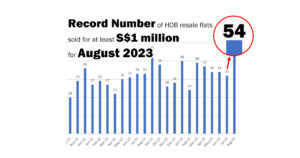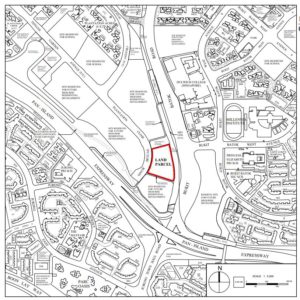Article contributed by:
Contact Person:
Gary, +65 9107 5225, gary@smtplaw.com, www.smtplaw.com, M/s Sim Mong Teck & Partners.
–
Background

The Sellers had granted to the Purchaser an Option to Purchase a property at the price of $1,850,000 (“Option”) in exchange for an option fee of $18,500 on 16 November 2011. The sale and purchase of the Property was subject to the Singapore Law Society’s Conditions of Sale 1999 (“the Conditions”).
The Purchaser exercised the Option on 29 November 2011 and paid $74,000. The total payment of $92,500 formed the deposit for the Property (“the Deposit”).
The contractual completion date was set to take place on 17 January 2012 (“the January Completion Date”).
On 12 January 2012, both parties agreed to defer the January Completion Date to 23 March 2012 (“the March Completion Date”). At the same time, the Purchaser requested to move into the Property. The Sellers agreed and on 18 January 2014, the Purchaser signed a Letter of Indemnity and Undertaking (“the Letter of Indemnity”) that set out the conditions for occupying the Property.
On 19 March 2012, the Purchaser requested that the March Completion Date be postponed as she required more time to obtain financing to complete the transaction. It was eventually agreed the completion will be rescheduled to 25 June 2012 (“the June Completion Date”) on the condition that $120,000 be paid to the Sellers. The $120,000 comprised of:
- $18,000 as discounted rent for the period of 24 March to 25 June 2012 (“the 3-month rent”) at $6,000 per month;
- $102,000 as further deposit towards the purchase price of the Property.
The cheque for the $120,000 was dishonoured and the Purchaser issued another cheque for $100,000.00 (being $82,000 for additional deposit and $18,000 for the 3-month rent). The Sellers are not suing for the $20,000 shortfall.
Subsequently, the Purchaser asked that the June Completion Date to be postponed to 29 June 2012 (“the extended June Completion Date”). The Sellers agreed provided the Purchaser pays for the Sellers’ bank charges, accrued interest and prepayment fee (“the charges”).
Thereafter, the Purchaser again sought to postpone the extended June Completion Date and it was agreed that the matter be completed on 6 July 2012 (“the July Completion Date”) and the Purchaser will pay:
- a further deposit of $110,000;
- the charges;
- rental at $7,500 per month from 26 June up till the July Completion Date.
At this point, aside from the 3-month rent, the Purchaser had paid $284,500 (being the Deposit and 2 additional deposits (“the Additional Deposits”)).
On 4 July 2012, the Purchaser again asked to postpone the completion to 10 July 2012. The Sellers rejected the request and informed that if completion does not take place by 6 July 2012, 21-days’ notice to complete will be served.
The matter could not be completed on the July Completion Date and the Sellers’ solicitors served 21-days’ notice to complete on 9 July 2012. The 21-days’ notice expired and the Sellers’ solicitors wrote on 3 August 2012 to rescind the Option and forfeit all monies and deposits previously paid and also demanded that the Purchaser vacate the Property immediately. However there was nothing from the Purchaser to indicate that she will be acceding to these demands.
After this, there was a series of correspondences between both parties’ solicitors where completion was purportedly deferred to 24 September 2012. The Sellers asked for $22,500 (as rental from 26 June to 23 September 2012) and $19,635.52 as 50% of the late completion interest, which the Purchaser requested to waive. The Sellers rejected the request and reiterated the demands made on 3 August 2012.
On 24 October and 9 November 2012, the Purchaser’s solicitors wrote to ask for the return of the sum of $149,864.48 (being the Additional Deposits less the sums of $22,500 and $19,635.52). The Sellers did not reply and repeated their previous demands. The Purchaser again requested for a postponement of completion to 8 January 2013 which was rejected.
Even after the Sellers filed an originating summons on 21 January 2013 to claim against the Purchaser and as late as 6 May 2013, the Purchaser was still occupying the Property and only returned the keys on 17 June 2013.
Sellers’ Claim

The Sellers sought to claim, amongst other things, for the following:
- rent at $7,500.00 a month from 26 June 2012 to the date of vacant possession (“Issue 1”) ; and
- forfeiture of $284,500.00 paid to the Sellers as deposit (“Issue 2”).
The Court’s Decision

Issue 1
It was stated in the Letter of Indemnity that if the matter cannot be completed on the completion date, the Purchaser is to deliver vacant possession and all keys to the Property to the Sellers, failing which the Purchaser shall pay a monthly rental of $7,500 per month in addition to late completion interest and/or damages.
The Purchaser’s solicitor had argued that it was wrong to claim both rent as well as the forfeiture of the deposit and the Sellers had to choose one or the other. According to the Purchaser’s solicitor, the claim for rent was in reality a claim for damages for repudiation of the Option.
However, the Court disagreed that the claim for rent was a claim for damages for the Purchaser’s repudiation of the Option. The Court said the claim for rent was made under a separate contractual agreement which was the Letter of Indemnity. Therefore, the Letter of Indemnity was to be treated as a separate agreement for the payment of rent and the Purchaser was ordered to pay $88,000 as rental pursuant to the Letter of Indemnity.
Issue 2
The Sellers’ position was that the Additional Deposits were further deposits which the Purchaser had agreed to pay for postponing the completion of the sale and purchase of the Property and that the Deposit and Additional Deposits fell within the meaning of Condition 29.8 (c)(i) which reads as follows:
“29.8 If the Purchaser does not comply with the terms of an effective notice served by the Vendor under this Condition, then the following terms apply: …..
C. without prejudice to any other rights or remedies available to him at law or in equity, the Vendor may –
I. forfeit and keep any deposit paid by the Purchaser …”
The Purchaser argued against this and took the view that the Sellers were only entitled to forfeit the Deposit of $92,500 but not the Additional Deposits as the Deposit was defined in the Option as being 5% of the purchase price and there was no agreement to forfeit the Additional Deposits. Instead, the Additional Deposits were payments in advance which could not be forfeited and it was unconscionable to forfeit the Additional Deposits.
The Court then set out to determine whether the Additional Deposits were deposits or advance payments.
The Option and the Letter of Indemnity did not define a “deposit” or provide for the additional payment of deposits except for Condition 29.8(c)(i) which stated that the Sellers were entitled to forfeit “any deposit” if the notice to complete was not complied with. The wording of Condition 29.8(c)(i) could be construed to envisage, by implication, the payment of further deposits and their forfeiture.
In this case, the Sellers relied upon the correspondences on how the Additional Deposits came to be paid by the Purchaser. The nature and purpose of the Additional Deposits had to be gathered from the intention of the parties expressed in the agreement. Here, the Sellers’ solicitors’ letters to the Purchaser’s solicitors had stated that the Additional Deposits were “further deposits” and were meant to secure the Purchaser’s interest in completing the purchase of the Property.
The Sellers requested for the Additional Deposits when the Purchaser repeatedly requested to delay completion. Not only did the Purchaser delay the completion by several months, she had also stayed at the Property for a good number of months and had all this time reiterated her desire to acquire the Property. Thus, the only way to assure the Sellers that she would complete the purchase was to make payment by way of Additional Deposits.
What was of significance was that it was not disputed that the Purchaser, through her solicitors acting for her in the purchase of the Property, had accepted that the Additional Deposits were indeed further deposits.
The Sellers could have served the 21 days’ notice to complete and rescind the Option when the Purchaser did not complete by the March Completion Date. Instead, they did not do so because the Purchaser had agreed to pay the Additional Deposits.
The correspondences and actions of the parties revealed that the parties had always treated the Additional Deposits as deposits.
The Court also took the view that the Additional Deposits of $192,000 (which was about 10.3% of the purchase price) were reasonable as the Additional Deposits were made to pay the Purchaser an extra four months of time up till the end of July 2012.
Plus the size of the Additional Deposits was reasonable (and not unconscionable) in the circumstances to provide an assurance to the Sellers that the Plaintiffs would complete.
By:
Leong Li Lian
Advocate & Solicitor
–
Note:
The above article is intended to provide general information. Although we endeavour to ensure that the information contained herein is accurate, we do not warrant its accuracy or completeness or accept any liability for any loss or damage arising from any reliance thereon. The information herein should not be treated as a substitute for separate legal advice concerning particular situations. If you would like to obtain advice, please do not hesitate to get in touch with Gary, +65 9107 5225, gary@smtplaw.com, M/s Sim Mong Teck & Partners.
This newsletter is meant for a restricted circulation confined exclusively to SMTP’s working partners and is not to be disseminated. No reference to or quotation from the newsletter is permitted.
This newsletter is published on PropertyNet.SG with approval from SMTP.
Enjoy what you have been reading? Join our mailing to get valuable insights delivered to your inbox today.





